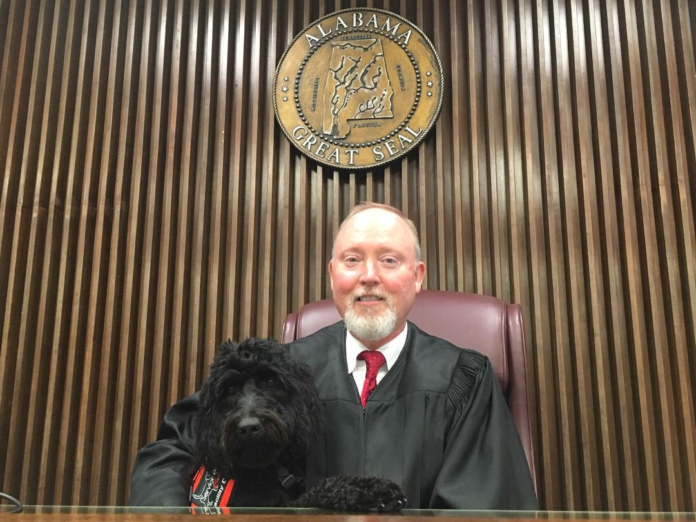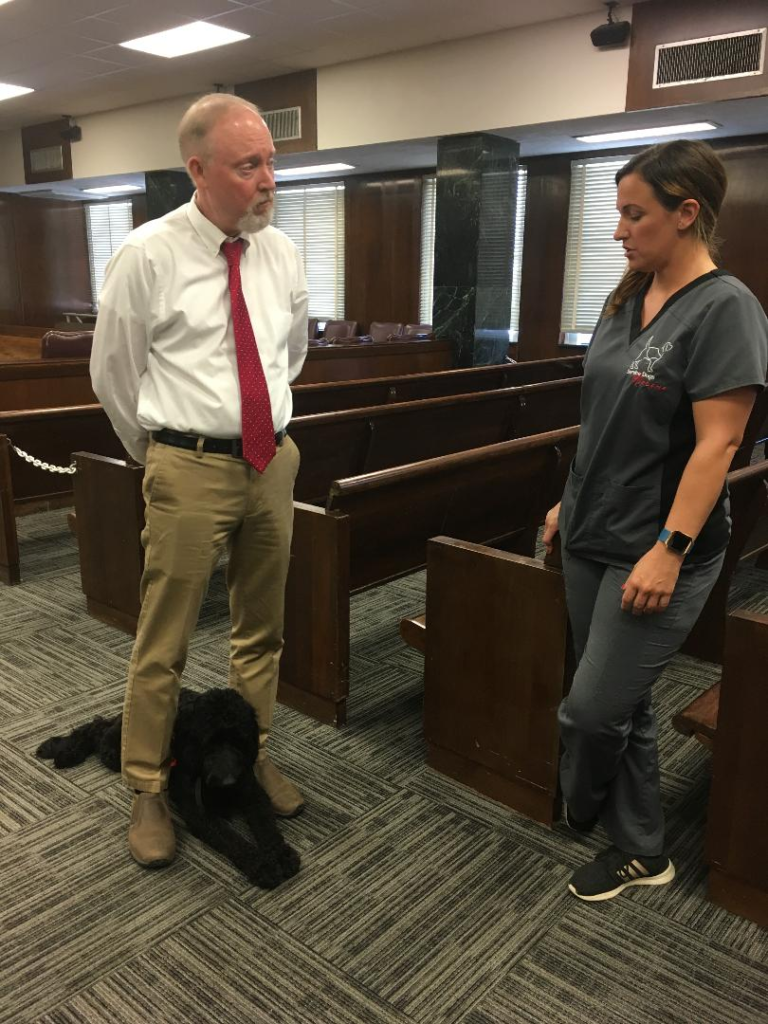
CULLMAN, Ala. – The Cullman County Courthouse on Monday officially welcomed its newest officer, Brooksie, a 2-year-old female labradoodle trained by Service Dogs Alabama (SDA).
SDA head trainer Ashley Taylor, who delivered Brooksie to Circuit Judge Gregory Nicholas Monday afternoon, told The Tribune:
“She’s fully trained. She’s trained to pick up on stress and anxiety. She’ll do a couple of different things: she’ll lean up against the person, she’ll put her head in their lap for them to stroke her while they’re on the stand or testifying. And she knows over 50 commands.”
Brooksie will “work” at the courthouse in several different courts, as well as the Child Advocacy Center and other programs. She will spend her off time at Judge Nicholas’s home.
Taylor supervises a two-year program to develop dogs for various forms of work, including diabetic service, seizure alert, stability/balance, wheelchair assistance, autism anxiety interception and PTSD episode response.
In an interesting twist, 18 months of the dogs’ training is done by Alabama inmates under SDA supervision. That’s right: folks in prison for committing crimes are working in a program to help crime victims. And it’s good for everyone: SDA reports on its website that not a single inmate involved in its training program, who has subsequently been released, has yet returned to prison. Training service dogs in prison over a period of time, according to SDA, improves life skills including parenting, self-control, anger and emotion management, communication skills, teamwork, compassion and purpose.
SDA was the first organization to place a dog in an Alabama court, sending a service dog named Kit Kat to Dale County in Oct. 2015. The group’s dogs are currently in use around Alabama in courthouses, schools (where their use has been shown to reduce isolation of special needs students and improve academic performance and grades) and as personal service animals. In fact, this court came into contact with SDA through a Cullman County veteran who has a PTSD service dog, and one previous candidate for Cullman’s court dog was placed with an autistic child in the county.
The dogs are trained to sense increasing heart rate, blood pressure and other indicators that their assigned human’s stress levels are getting out of control, and respond with subtle distraction techniques like nose nudges or putting their heads in the human’s lap to help ground them and pull them out of panic attacks and other negative stress reactions.
As traumatized victims- especially children- testify in court, according to Taylor, “The dog’s laying their head in their lap and letting them pet the dog helps them. You know, it doesn’t feel like someone’s staring at you when you’re having to retell all these things. They, a lot of times, will say the person is looking down the whole time at the dog, stroking the dog, and it’s a little bit easier for them to get the words out. You do not get them having panic attacks as much. They typically are giving way more details because they feel at ease; you know, their anxiety is being relieved, and it’s easier for them. They feel like they’re talking to the dog, and obviously a dog is not judgmental.”
Cullman has been on the waiting list for a facility dog for more than six months. As late as last week, the county was still looking at up to two more months, but SDA felt like Brooksie was ready, so they brought her on in. She is the third facility dog placed in a courthouse by the training service; other courts around the state also have facility dogs supplied by other services.
Nicholas told The Tribune Monday afternoon, “Testifying in a legal proceeding can sometimes be a traumatic experience, especially for child witnesses and developmentally delayed adults who have been victims of abuse or neglect.
“Several years ago, I presided over a criminal murder trial where the only eyewitness to the crime was a child. Despite many gentle attempts by the prosecuting attorney to get the child to tell what she had observed, the child was simply so nervous that she was unable to answer any questions. I don’t know whether the child would have been able to testify with the assistance of a court facility dog, but I think it’s important that judges do everything possible to make testifying in court easier for all witnesses, especially children.
“Numerous studies show that court dogs help witnesses remain calm and to focus on telling a judge or jury about what they have seen or what has happened to them. Court facility dogs are becoming more commonly used in courtrooms throughout the country because the dogs make a real difference in calming the nerves of witnesses so that they can tell about what they have seen.
“I was initially somewhat skeptical about the idea, but the more data I looked at and after talking with other judges with court facility dogs about their experiences, I became convinced that having a court dog will provide some practicable benefits at no cost to the public. Brooksie is a welcome addition to the Cullman County courts and she will provide many years of faithful service.”
Note: in an earlier story on Alabama and Cullman court dog programs, The Tribune included information from SDA and the Alabama District Attorneys’ Association facility dog program. ADAA’s program dogs are provided by a different service, and the two programs are not affiliated.
For more on court dogs and other programs of Service Dogs Alabama, visit www.servicedogsalabama.org.
Copyright 2019 Humble Roots, LLC. All Rights Reserved.

Brooksie takes a break as Judge Nicholas talks to SDA trainer Ashley Taylor. (W.C. Mann for The Cullman Tribune)

















